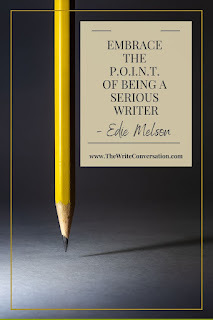Edie Melson's Blog, page 131
March 30, 2022
How to Become a Mentally Strong Writer

By Edie Melson @EdieMelson
Pursuing the craft of writing as a calling and/or a career can be an incredibly rewarding path through life. It can also be equally difficult. When we create something and then offer it up to the world, we open ourselves up to criticism and judgement. The painful things said about what we write is an inescapable part of being a writer.
Navigating a world filled with criticism can be exhausting—if we’re not prepared. That’s what this post is about—strengthening our minds in regard to our writing.
7 Tips to Become a Mentally Strong Writer
1. Know why you write. For me it’s two-fold. First, I write because that’s the way God designed me to process the world. When I write out my difficulties or questions, I find answers. Second, I write because I believe there was a moment in time when God called me to write for Him. To me, that means using my writing to honor Him and bless others.
2. Pray regularly. This leads to my ONE and only hard-and-fast-rule-of-writing. Always pray before your fingers hit the keys, pick up a pen or even touch the text pad. In the world today our words go farther and faster than we ever imagined would be possible. That makes it even more critical that those words should first be submitted to God before we send them out.
3. Keep your defense close at hand. As a believer who writes, the only critique that should matter is what God says about my writing. So I keep a list of Bible verses that I’ve claimed in regard to my writing close at hand. Here are three of my favorites:Therefore, this is what the Lord says: “If you return, then I will restore you— You will stand before Me; And if you extract the precious from the worthless, You will become My spokesman. They, for their part, may turn to you, But as for you, you are not to turn to them. Jeremiah 15:19 NASBNow faith is confidence in what we hope for and assurance about what we do not see. Hebrews 11:1 NIVFor the gifts and the calling of God are irrevocable [for He does not withdraw what He has given, nor does He change His mind about those to whom He gives His grace or to whom He sends His call]. Romans 11:29 Amplified Bible4. Resolve to consider. When I hear something difficult about what I’ve written, my first instinct is to leap to defense. I’ve learned that a better response—and one that reduces my stress level—is to consider what being said. I can ultimately reject it, but if I consider it, I can pull anything valuable out of the criticism without discarding it in anger.
5. Enlist a community of other writers. It’s almost impossible to do this writing life alone. My writing friends understand a difficult day at the keyboard, a bad review, and the ultimate joy of publication. My other friends, who don’t write, celebrate with me and are great encouragers, but they do not know the path I walk.
6. Stay humble and acknowledge there are always things that must be learned. When I was a young (in experience years) writer, I thought those far ahead of me had actually arrived. Now I know there is never such a thing as having arrived as a writer. When we commit to being a writer we commit to a life of learning. And often times lifelong re-learning. The world is changing and even experienced writers are constantly readjusting. Being careful to live through each situation as someone ready to be taught, instead of someone who knows the answer will save a huge amount of heartache.
7. Decide now who gets to speak truth in regard to writing. There are always plenty of people ready to tell you who, what, when, where, why and how to do what you do. Some of the advice will be good and some…well…not so good. Instead of treating everything as truth, decide those few you’ll accept advice from. This doesn’t mean you’ll dismiss everyone else, just weigh what you hear from anyone outside your trusted guard.
Bottom LineBe equipping ourselves as writers we will be able to stand when life gets hard. We will also have some side benefits.
Along with the strength comes:Assurance. Not really assurance in myself, but in God and the fact that He is directing my steps. More than that, I know for certain that if I get off the track, He will gently guide me back where I should be.Peace. By developing this strength, I can have peace when the difficult words come. I know where to go for truth and how to reject the lies. Joy. All of this brings me the ability to experience incredibly joy in the gift of writing God has given me.Now it's your turn. What would you add to my list to help us become mentally strong writers? Remember, we're all stronger together, so don't hesitate to share!
Don't forget to join the conversation!Blessings,Edie
TWEETABLEHow to Become a Mentally Strong Writer, 7 Tips from @EdieMelson (Click to Tweet)
 Edie Melson is a woman of faith with ink-stained fingers observing life through the lens of her camera. No matter whether she’s talking to writers, entrepreneurs, or readers, her first advice is always “Find your voice, live your story.” As an author, blogger, and speaker she’s encouraged and challenged audiences across the country and around the world. Her numerous books reflect her passion to help others develop the strength of their God-given gifts and apply them to their lives. Connect with her on her website, through Facebook, Twitter, and Instagram.
Edie Melson is a woman of faith with ink-stained fingers observing life through the lens of her camera. No matter whether she’s talking to writers, entrepreneurs, or readers, her first advice is always “Find your voice, live your story.” As an author, blogger, and speaker she’s encouraged and challenged audiences across the country and around the world. Her numerous books reflect her passion to help others develop the strength of their God-given gifts and apply them to their lives. Connect with her on her website, through Facebook, Twitter, and Instagram.
Published on March 30, 2022 22:00
March 29, 2022
As Writers We've Accepted the Post of Ambassador

by Edie Melson @EdieMelson
Therefore, we are ambassadors for Christ, certain that God is appealing through us. 2 Corinthians 5:20 (HCSB)
I’m constantly amazed at how God chooses to use me in the work He’s doing in this world. It’s humbling and terrifying at the same time. I’ve been looking at this verse, trying to wrap my mind around what being an ambassador for Christ looks like when it’s applied to the life of a writer. As I studied the parallels between the role of ambassadors in world governments and our role as Christ—following—writers, I was struck by the lessons hidden there.
The first thing I saw was the fact that, here in the political world, those who are ambassadors don’t live in their own countries. They are strangers in a strange land. That’s also true of believers. This world is our temporary home, even though our time here can sometimes seems endless.
Next, I realized that ambassadors are appointed, not elected. They haven’t campaigned for their position, it’s a gift of responsibility. We are also appointed—as believers and as writers for the kingdom—chosen by God and elevated to the position of spiritual ambassador. It’s not because we’re better than anyone else, it’s simply a gift of grace.
Finally, earthly ambassadors don’t get to choose their country of service. That too is the choice of the one they serve. As writers, we have each been chosen to serve where God places us. He’s the one who brings the words, the contracts, and the publication.
As a writer, I’ve often chaffed at this restriction. I wanted to do big things for God. I had a definite opinion about where and how I wanted to live out my dream. Thank goodness God had other plans.
It turns out, when I look back, His plans were much better. They went farther and deeper than I ever imagined. For some reason, we writers tend to think too small. And we assume that if God doesn’t do things our way, the outcome will be just a shadow of what we want. That couldn’t be farther from the truth.
A Prayer for an Ambassador in a Strange Land
For this world is not our permanent home; we are looking forward to a home yet to come. Hebrews 13:14 (NLT)
Dear Lord, every day I’m reminded that I live in a place that isn’t my home. This world becomes more and more strange as it drifts farther from Your truth. I often wonder how a writer who follows You can have any impact in such an evil time as this.
I know Your Word tells us that the world hated You and it will hate those who belong to You, but somehow I didn’t expect it to hurt so much. I’m weary of writing to a culture that has nothing but contempt for You. They celebrate the things that bring You sorrow and ridicule the things You hold dear.
I thought when I agreed to write for You that I’d be writing to those who know You. I’d encourage my brothers and sisters, and lead those eager to know You into a deeper relationship. Instead You’ve sent me into places where people hate You. You’ve asked me to stand up for You on social media and through all sorts of uncomfortable situations.
You’ve asked me to learn about technology that scares me, and reach out to people who already hate me. I’m such a coward at heart and I need Your courage as I continue to follow You.
Surround me with other believers who can encourage me. Use us to strengthen one another as we go into the world bearing a light it’s determined to extinguish. Keep me strong and focused on You, no matter what. Amen
*This post is an excerpt from Soul Care for Writers (Bold Vision Books 2019)
TWEETABLEAs Writers We've Accepted the Post of Ambassador - thoughts from @EdieMelson (Click to Tweet)
 Edie Melson is a woman of faith with ink-stained fingers observing life through the lens of her camera. No matter whether she’s talking to writers, entrepreneurs, or readers, her first advice is always “Find your voice, live your story.” As an author, blogger, and speaker she’s encouraged and challenged audiences across the country and around the world. Her numerous books reflect her passion to help others develop the strength of their God-given gifts and apply them to their lives. Connect with her on her website, through Facebook, Twitter, and Instagram.
Edie Melson is a woman of faith with ink-stained fingers observing life through the lens of her camera. No matter whether she’s talking to writers, entrepreneurs, or readers, her first advice is always “Find your voice, live your story.” As an author, blogger, and speaker she’s encouraged and challenged audiences across the country and around the world. Her numerous books reflect her passion to help others develop the strength of their God-given gifts and apply them to their lives. Connect with her on her website, through Facebook, Twitter, and Instagram.Photo by Christina @ wocintechchat.com on Unsplash
Published on March 29, 2022 22:00
March 28, 2022
Effective Blogging: 14 Dos & Don'ts for Writers to follow

by Edie Melson @EdieMelson
I love to blog, and I try to share my love of blogging when I teach at writing conferences.
I also know that many of you aren’t such fans. Many try to love blogging because it’s a good way to connect with readers and build an online presence. Others, don’t even try to love it, but do it out of necessity. The rest are like me, and enjoy the process as well as the connections it brings.
No matter where you are with blogging, it’s important to do it well. Whether you blog twice a month on a group blog, or daily on your own site, there are some essential dos and don’ts of blogging that I’d like to share today.
Blogging is a great way to build relationships with our audience.
But a lot of people forget that, just like building relationship in person, it’s never a good idea to talk so much that others don’t have a chance to share their thoughts.
I often visit blogs where I want to ask the blogger, “Are you blogging or lecturing?” There are things we can do to make sure our posts encourage conversation. And there are things we can do that discourage interaction.
The Dos of Blogging
End every blog post with an open-ended question or a call to action. It’s not enough to ask a question at the end of the post. We must make sure the answer to the question isn’t just yes or no.Make sure the question posed doesn’t have an assumed right or wrong answer. This will shut down conversation even faster than a yes or no question. If we ask a question that has a definite right or wrong answer, very few people will be willing to risk the wrong answer. And after several have answered the question correctly, we’ll find no one else is answering because they feel like everything that needs to be said has been said.Ask readers to share an experience that relates to the post. Sometimes a blog post won’t lend itself to a question. In those instances we can encourage our audience to share their experience.Ask readers to add to a list of suggestions or tips that have been shared. I do that a lot on here. (And I’ll do it at the end of this post.) Again, if a question isn’t appropriate or feel right, ask them to contribute to the topic already introduced.Avoid using the pronoun YOU whenever possible. This is especially true if the post is pointing out something negative. Using the word you carries a finger-pointing connotation that we want to avoid. For example, in the point above, I would never say, “you must make sure the answer to the question isn’t just yes or no.” Instead, I phrased it, “We must make sure the answer to the question isn’t just yes or no.” Share your own personal experience. If we’re asking someone else to share, we need to make sure our blogs are a safe place for that. Going first rarely feels safe. So I always try to make sure I share my own experience before asking my readers to share theirs.Always try to answer blog comments. This doesn’t mean every single comment has to be answered individually, although I do try to do that. It’s important that your readers don’t feel like they’re commenting to nobody.Do Keep a Schedule: I’ve said it before and I’ll continue to say it until the day I die. If we expect our readers to come back regularly, we must be dependable. How often would you visit a business if you never knew whether or not it would be open? If we don’t have a new post up when we say we will, it’s like we’re not open for business.Do Include Social Media Links in Your Sidebar and on every page: Don’t miss out on valuable connections on other networks just because you’ve forgotten to add social media links to your blog.Do Use Proper Formatting & Images: This means utilize bold headings, bullet points, and images to illustrate your posts. Proper formatting will break up the text and make the blog easier to be read. Make your post scannable. This proves your post’s value and makes it more likely to be read. The Don’ts of BloggingDon’t Make Your Post too Long: The ideal post length is between 700-900 words. Any longer and it’s much less likely to be read. Yes, there are exceptions. But those exceptions are just that, and many bloggers I talk to think they're the exception but they aren’t. It’s a hard truth, but shorter posts will up the engagement and readership of 98% of the blogs out there.Don’t Make Your Blog Hard to Read: Make sure the font used is a sans-serif font, like the one used here, which is VERDANA. As opposed to a serif font, like this one: Times New Roman. Also make sure your font is large enough to be easily read. Finally, be careful which colors you choose for your blog. White on black is best, but at the minimum make sure there is a high contrast between background and text.Don’t Use Vague Titles for Blog Posts: Our audience will judge our posts on the expectations we set in the titles we choose. Also, social media is often a world without context. Use this question when choosing a title: If someone were to only read the title, would they know what the post was about? If the answer’s no, then choose another title.Don’t Clutter Your Blog’s Sidebar: The sidebar of our blogs should be organized in the order of importance. If the most important thing to you is having people sign up for updates for your blog, then email and RSS signups should be at the top of your sidebar. If it’s hard for people to find your sign up or your social media links, you’re missing out on building your online audience.Remember the main purpose of blogging is building relationships.
To build those relationships, we have to be good hosts when it comes to our blogs and make our readers fee welcome. We have to make it a place where people want to visit and want join the conversation.
What makes you feel welcome when you visit a blog? What turns you off? Be sure to leave your thoughts in the comments section below.
Don't forget to join the conversation!Blessings,Edie
TWEETABLEEffective Blogging: 14 Dos & Don'ts for Writers to follow - tips from @EdieMelson (Click to Tweet)
Fun Image to Share on Pinterest!

 Edie Melson is a woman of faith with ink-stained fingers observing life through the lens of her camera. No matter whether she’s talking to writers, entrepreneurs, or readers, her first advice is always “Find your voice, live your story.” As an author, blogger, and speaker she’s encouraged and challenged audiences across the country and around the world. Her numerous books reflect her passion to help others develop the strength of their God-given gifts and apply them to their lives. Connect with her on her website, through Facebook, Twitter, and Instagram.
Edie Melson is a woman of faith with ink-stained fingers observing life through the lens of her camera. No matter whether she’s talking to writers, entrepreneurs, or readers, her first advice is always “Find your voice, live your story.” As an author, blogger, and speaker she’s encouraged and challenged audiences across the country and around the world. Her numerous books reflect her passion to help others develop the strength of their God-given gifts and apply them to their lives. Connect with her on her website, through Facebook, Twitter, and Instagram.Featured Image: Photo by Monika Stawowy on Unsplash
Published on March 28, 2022 22:00
March 27, 2022
Top 10 Tips To Survive a Writing Conference

by Ane Mulligan @AneMulligan
On my writers loop, someone said this was their first time to go to a writing conference and asked for advice.
As a conference veteran—I’ve been to a few dozen—I offer the following:
1. Don’t be terrified. I promise you’ll love it. Look for names you recognize. Some conferences give you regional or state stickers to add to your name tag to help connect with others in your area.
2. If you can, go a day early and volunteer to help stuff packets or something. That gives you a few friends right from the start.
3. Don’t push yourself. If you start to feel overloaded, skip a class or a general session and do something else. If you overload your senses, you won’t learn anyway. You can always pick up that class at another conference or get the notes from a friend.
4. Make use of the grounds—take a walk. Go to your room and take a nap. Go to the coffee shop and refuel.
5. If you plan to pitch to an agent or editor, practice at home and with friends. Agree with a couple of pals to call each other at random, unplanned hours and ask, “Tell me about your book.” Do that until you stop swallowing your tongue or stuttering.
6. Remember, agents and editors are people, too. They are there to find the next great book. It might as well be yours. If allowed, use mealtime to pitch at the tables, but don’t monopolize the conversation. Again, practice until you can deliver your pitch in 30 seconds. Then close your mouth. If you babble on for a long time and don’t give anyone else a chance, the editor/agent will think you do that in your writing, too. A good byword: Less is more.
7. Networking is as big a part of conference as the classes and pitch sessions. That’s how I met my critique partners back in 2005.
8. A word for the wise: never...I repeat...never follow an agent or editor into the restroom to pitch. Elevators are okay, but the restrooms are off limits. And don’t think it’s never happened.
9. Don’t set wild expectations. You will NOT be handed a contract at breakfast.
10. For first timers (especially if you’re a fairly new writer) simply sit back and enjoy being among people who actually "get you.”
TWEETABLETop 10 Tips to Survive a #Writing Conference, insight from @AneMulligan on @EdieMelson (Click to Tweet)
 Ane Mulligan has been a voracious reader ever since her mom instilled within her a love of reading at age three, escaping into worlds otherwise unknown. But when Ane saw Mary Martin in PETER PAN, she was struck with a fever from which she never recovered—stage fever. She submerged herself in drama through high school and college. Years later, her two loves collided, and a bestselling, award-winning novelist emerged. She resides in Sugar Hill, GA, with her artist husband and a rascally Rottweiler. Find Ane on her website, Amazon Author page, Facebook, Twitter, Instagram, Pinterest and The Write Conversation.
Ane Mulligan has been a voracious reader ever since her mom instilled within her a love of reading at age three, escaping into worlds otherwise unknown. But when Ane saw Mary Martin in PETER PAN, she was struck with a fever from which she never recovered—stage fever. She submerged herself in drama through high school and college. Years later, her two loves collided, and a bestselling, award-winning novelist emerged. She resides in Sugar Hill, GA, with her artist husband and a rascally Rottweiler. Find Ane on her website, Amazon Author page, Facebook, Twitter, Instagram, Pinterest and The Write Conversation.Featured Image: Photo by Juli Kosolapova on Unsplash
Published on March 27, 2022 22:00
March 26, 2022
Write an Active Main Character with These 5 Tips

by Zena Dell Lowe @ZenaDellLowe
One of the most important rules of story is that your main character must drive the action of the story. He cannot be passive. When you have a passive character, it means that things are happening to him as opposed to him making things happen in the story.
The problem is, there are times when a main character is rendered powerless. For example, what happens if the bad guys suddenly take your main character by surprise? What if his plans backfire? What if all hell breaks loose? Your main character is supposed to drive the action of the story, but how can he when so many things happen that are beyond that character’s control? What can we do when circumstances put our character in a situation where all he can do is react?
5 Tips to Write an Active Main Character
1. Replace the meta goal with mini goals.When you have a character like this, it's essential that you give him appropriate mini goals that he can actively work on, even if he's not the master of his immediate fate. For example, in my dad’s novel, Riley McStephens: Cabin Boy, Riley is a young boy who’s been sold into servitude to pay for his uncle’s debt. Riley objects to this practice, but he’s obviously powerless to change it. So, he vows to become a rich, powerful man who can someday affect that change.
When it comes to story structure, there is a META objective, which is the main thing that your character wants and must pursue throughout the entire story, and there are MINI objectives, which are smaller goals that the main character must accomplish along the way, which are necessary to the character being able to achieve the primary goal. Sometimes you have a character who isn’t able to pursue the meta-goal just yet for whatever reason.
In the case of Riley, his meta goal cannot immediately be reached, and yet he CAN act now in the form of mini goals, which are dictated by the overarching objective. In other words, the meta-goal guides his choices. He only pursues the things that make sense according to the long-term goal. So maybe Riley learns everything he can about being a cabin boy in order to earn the captain’s favor, or befriends the deckhands, which means gathering allies. Maybe he needs to befriend the cook, so he won’t starve. He may not be able to pursue the meta objective just yet, but everything he does should take him closer to that goal.
2. Use the time to acquire essential resources.When a character is prevented from pursuing their meta-goal temporarily, it’s actually an opportunity for them to acquire much needed skills and assets that they’ll need later on, when the opportunity to pursue the meta-goal resurfaces. In the example of Riley, the mini-goals allow him to increase his knowledge, skills, allies, influence, and power—assets he must acquire if he hopes to achieve the ultimate goal later.
The character should be acquiring anything and everything of value, whatever he can put to good use when the time is right. Mini goals are not wasted, arbitrary or unimportant. They are essential. Like Joseph acquiring skills in the house of Potiphar, Riley's mini goals similarly train him, equip him, harden him, teach him, and prepare him to accomplish the big goal down the road.
3. Use obstacles as rites of passageInevitably, your main character will encounter obstacles. Otherwise, he would immediately achieve their meta goal and the story would be over. An obstacle is basically anything that stops your character from being able to achieve their objective at that moment. But this doesn’t mean it must stop him cold. It must still move the story forward. Maybe it provides some new clue or idea, but one way to use obstacles is to allow them to test the mettle of your character.
When an obstacle comes along, it gives the character a chance to test their skills and wits against whatever it is trying to stop them. They become tests and rites of passage that must be overcome in order for the main character to proceed on his journey, something that prepares him for to climactic conflict. Just as mini goals allow the character to acquire resources, obstacles allow them to acquire crucial life experience. What could be more valuable than that?
4. Don’t expect a character to drive the action of the story until after the inciting incidentWhen the story opens, we're generally going to meet your main character in one of two states: either life is good and they're happy (in which case, their world is about to implode), or life is bad and they’re unhappy (in which case, their world is about to implode). Either way, we meet them in their normal world as they go about their normal business, and then, WHAM, something happens, which launches the character into action.
The inciting incident is usually something that happens to the character out of the blue, which launches the character on their journey. It’s rarely the result of the character’s choice. Just like human beings, our characters typically avoid change. We're all afraid of the unknown. This is why the inciting incident is almost always something that happens to the character rather than something the character causes or seeks.
If it feels like your character is passive at the start, don’t worry. However, once the inciting incident occurs, we expect the main character to take over. Your main character should drive the action from that point forward because the inciting incident gives them the meta-goal that they’re going to pursue for the entire rest of the story.
5. Don’t lose site of the meta-goal even when it’s temporarily out of reachWhen mini goals take over, it’s easy to lose sight of the bigger picture. But it’s essential to keep the meta-goal in mind even during temporary disruptions. Otherwise, the story will start to drag and lose focus. The stakes will drop, the tension dry up, and the main character will seem to flounder.
An essential step in avoiding this is to make sure the meta-goal is clearly defined from the beginning. The main objective must be clear. Both the audience and your main character need to know what the over-arching goal is, and then your main character must pursue that goal relentlessly. So, even when the character’s efforts to do so are temporarily derailed, the audience will remain invested in the story—as long as the mini-goals seem logical and necessary to them, according to the bigger meta-goal at stake.
If the audience feels the character is pursuing meaningless goals that have nothing to do with the story, they will quickly grow frustrated and lose interest. The mini goals must be reasonable according to the bigger objective at stake. Do the steps ring true to the audience? If so, they'll stay emotionally invested in the story.
ConclusionThe overarching principle is that a character drives the action of the story as he pursues a meta goal, but mini goals inevitably emerge along the way, which he must overcome in order to get closer to achieving the primary objective. Responding to these obstacles is not necessarily passive as long as the mini goals are necessary objectives that help him get closer to the real goal. Use these moments to acquire skills, knowledge, resources, allies, whatever they're going to need at the end of the story to make their final stand.
TWEETABLEWrite an Active Main Character with These 5 Tips from @ZenaDellLowe on @EdieMelson (Click to Tweet)
 Zena has worked professionally in the entertainment industry for over 20 years as a writer, producer, director, actress, and story consultant. Zena also teaches advanced classes on writing all over the country. As a writer, Zena has won numerous awards for her work. She also has several feature film projects in development through her independent production company, Mission Ranch Films. In addition to her work as a filmmaker, Zena launched The Storyteller’s Mission with Zena Dell Lowe, a podcast designed to serve the whole artist, not just focus on craft. In 2021, Zena launched The Storyteller’s Mission Online Platform, where she offers advanced classes and other key services to writers. Zena loves story and loves to support storytellers. Her passion is to equip artists of all levels to achieve excellence at their craft, so that they will truly have everything they need to change the world for the better through story.
Zena has worked professionally in the entertainment industry for over 20 years as a writer, producer, director, actress, and story consultant. Zena also teaches advanced classes on writing all over the country. As a writer, Zena has won numerous awards for her work. She also has several feature film projects in development through her independent production company, Mission Ranch Films. In addition to her work as a filmmaker, Zena launched The Storyteller’s Mission with Zena Dell Lowe, a podcast designed to serve the whole artist, not just focus on craft. In 2021, Zena launched The Storyteller’s Mission Online Platform, where she offers advanced classes and other key services to writers. Zena loves story and loves to support storytellers. Her passion is to equip artists of all levels to achieve excellence at their craft, so that they will truly have everything they need to change the world for the better through story.To find out more about Zena or her current courses and projects, check out her websites at WWW.MISSIONRANCHFILMS.COM and WWW.THESTORYTELLERSMISSION.COM
Featured Image: Photo by Miguel Bruna on Unsplash
Published on March 26, 2022 22:00
March 25, 2022
Embrace the P.O.I.N.T. of Being a Serious Writer

by Edie Melson @EdieMelson
Many of us came to the world of writing in a roundabout way. A lot of us don’t have degrees that qualify us. Because of that, we often struggle with insecurity.
We strive for validation through publication.
But no matter how many awards we win, things we publish, followers we have, the only validation that lasts is confidence.
And confidence is a decision, not a designation.
Who we are, knowing what we were called to do or even where we are on the journey. But it always takes a great dollop of faith to make it stick.
And some days it sticks better than others.
So here is my acronym for getting to the point of writing confidence, which is foundational to being a serious writer.
The P. O. I. N. T. of Being a Writer
P is for persistence, permission, and patience. Being a writer is a journey, not a destination, so it takes persistence to stay the course. Beyond that, it’s not a path that ends in perfection. To be confident in ourselves means we have to give ourselves permission to to try things and fail. Failure is an option and frequently holds the key to learning the best secrets. Finally, we must have patience. Nothing about being a serious writer comes overnight.
O is for optimism, organic, and obstacles. The writing journey isn’t easy, and that’s especially true if we’re only looking for the worst in ourselves and everything around us. We have to develop a glass-half-full-mentality to survive. Organic is the best kind of growth for a writer. We all progress at our own speed. Comparison is the quickest way to discouragement. Finally obstacles—there are always bumps in the writing road, no matter how far along we are. Obstacles are challenges to be met, hardships to be conquered, and barriers to get around. They are NOT excuses to stop.
I is for insecurity, intuition, and inconceivable. Insecurity isn’t something that disappears on its own. It’s one of those obstacles that must be conquered—sometimes on a daily or even hourly basis. Accept the fact that almost one hundred percent of those writing feel insecure. Intuition is often something we must learn to trust. We should take critique well, but we must become secure in our own abilities. Finally inconceivable is the emotion that happens when we take a minute to realize we’re living out our dream. It isn’t easy, but it’s a courageous thing to do and we should lean into that and celebrate on a daily basis.
N is for noise, never, and nevertheless. Noise is the chaos of life threatening to drown out the words clamoring to escape our souls. We must fight against the siren call of busyness and be about the work of writing. Never is the time when we quit. We never give up the pen. The only way to fail as a writer is to quit, so never is the driving beat deep within our souls. Nevertheless is how we keep moving forward. Certain things happen, but nevertheless we keep writing.
T is for toiling, testing, and THE call. Toiling is what we do. It’s more than just work, it’s the driving force that keeps us writing through the night and through the chaos of life. Testing is what happens again and again as we prove to ourselves we can persevere. Finally THE call is why I do what I do. I felt God whisper that I was a writer. I feel His joy as exercise the gift He’s given me. And one day I pray to receive the ultimate affirmation when I stand before Him. “Well done good and faithful servant.”
These are the points that make up the lines that create the words that we share with the world. I’d love to hear your thoughts on this writing life.
Don’t forget to join the conversation!Blessings,Edie
TWEETABLEEmbrace the P.O.I.N.T. of Being a Serious Writer - tips from @EdieMelson (Click to Tweet)
Here's a fun image to share on Pinterest!

 Edie Melson is a woman of faith with ink-stained fingers observing life through the lens of her camera. No matter whether she’s talking to writers, entrepreneurs, or readers, her first advice is always “Find your voice, live your story.” As an author, blogger, and speaker she’s encouraged and challenged audiences across the country and around the world. Her numerous books reflect her passion to help others develop the strength of their God-given gifts and apply them to their lives. Connect with her on her website, through Facebook, Twitter, and Instagram.
Edie Melson is a woman of faith with ink-stained fingers observing life through the lens of her camera. No matter whether she’s talking to writers, entrepreneurs, or readers, her first advice is always “Find your voice, live your story.” As an author, blogger, and speaker she’s encouraged and challenged audiences across the country and around the world. Her numerous books reflect her passion to help others develop the strength of their God-given gifts and apply them to their lives. Connect with her on her website, through Facebook, Twitter, and Instagram.Featured Image: Photo by Greg Rosenke on Unsplash
Published on March 25, 2022 22:00
March 24, 2022
10 Tips for a Successful In-Person Book Launch Party

by Lori Hatcher @LoriHatcher2
Two years ago, I planned an amazing in-person launch party to celebrate the release of my first book with Our Daily Bread Publishing, Refresh Your Faith. The week before the event, our country went into COVID lockdown. I scrambled to put together a Facebook Live event instead. (You can read Ten Components of a Successful Facebook Live Launch Party HERE.)
Last week, glory halleluiah, we were able to celebrate the release of Refresh Your Prayers, my second book with Our Daily Bread, IN PERSON.
Since some of us (myself included) are out of practice hosting live events, I thought I’d share ten tips for a successful in-person launch party.
10 Tips for a Successful In-Person Book Launch Party
Ask a gregarious friend to emcee the event.Having someone else up front frees you to greet people, sign books, and socialize. Provide them with an agenda to help the party stay on track and within the time frame.
Enlist a friend to handle book sales.Train them in advance how to handle electronic transactions and supply them with cash for change. Have them ask each person who’d like you to inscribe a book to write the name on a sticky note to be sure you spell it correctly.
Solicit or purchase prizes for giveaways.Everyone loves prizes, so be sure to have a few gift cards or book-related items to give away. Sometimes your publisher will provide these, and other times friends, launch team members, or local business owners are willing to donate them.
Consider a How Well Do You Know the Author? quiz.People love trivia, and they enjoy getting to know you better. Compile a list of ten questions, some easy and some harder, about you, your writing, your career, or your quirky facts. You might want to include multiple choices to make it easier. Award a prize for the person who gets the most answers right. Be sure to have a tie-breaker question ready, just in case.
Do a theme quiz if appropriate.My book is on prayer, so I put together a list of multiple-choice questions about prayer from the Bible. If your book takes place during a particular time period, you could focus your questions on that era. Is it about a historical figure? Compile trivia questions about them. Award a theme-appropriate prize to the winner.
Keep food simple.Your party isn’t a potluck or church social, so you don’t have to offer fifty options. And while food isn’t the focus, it is a fun part of the evening. Limit your choices to food that can be easily served and eaten, like finger sandwiches, cheese, meat, nuts, and fruit. Provide cupcakes instead of cake.
Ask for testimonials from beta or early readers.If some in attendance have received early reader copies, invite them to share their favorite part of the story or something meaningful from the book.
Consider combining the event with your writers group meeting.I’m part of an amazing Word Weavers International group. (Shout out to Lexington Word Weavers!) We love to celebrate our writers’ successes and will often hold a launch party on the same night as our group meeting. If you choose to do this, be sure your launch event doesn’t interfere with the regular parts of the meeting. We always hold the launch party before the meeting begins.
 Ask someone to take pictures and be sure to post on social media during and after.You’ll be busy visiting with your guests and will likely forget to take pictures. If you ask a friend to capture the highlights, you’ll have pictures to share and reminisce over later. Be sure to post the pics on your website, blog, or social media. This continues to raise the profile of your book and enables friends who missed the party to still feel part of the celebration.
Ask someone to take pictures and be sure to post on social media during and after.You’ll be busy visiting with your guests and will likely forget to take pictures. If you ask a friend to capture the highlights, you’ll have pictures to share and reminisce over later. Be sure to post the pics on your website, blog, or social media. This continues to raise the profile of your book and enables friends who missed the party to still feel part of the celebration.Thank God and those who helped make your book possible.Write down your thoughts in advance so you won’t forget someone. Invite a friend to pray over the party and the book and ask God to bless it.
I hope your next party is a marvelous success. It takes a tribe to write, publish, and launch a book. Hosting a launch party allow us to celebrate with our tribe and gives us a chance to point people to God, who made it all possible.
Now it’s your turn. What’s your best tip for launch party fun? Leave a comment below and share your insight.
TWEETABLE10 Tips for a Successful In-Person Book Launch Party - from author @LoriHatcher2 on @EdieMelson (Click to Tweet)
 Lori Hatcher is an author, blogger, writing instructor, women’s ministry speaker, and career dental hygienist. She writes for Our Daily Bread, Guideposts, Revive Our Hearts, and Crosswalk.com. Lori’s latest devotional, Refresh Your Prayers, Uncommon Devotions to Restore Power and Praise, released March 1 with Our Daily Bread Publishing. Connect with her at www.LoriHatcher.com or on Facebook, Twitter (@lorihatcher2) or Pinterest (Hungry for God).
Lori Hatcher is an author, blogger, writing instructor, women’s ministry speaker, and career dental hygienist. She writes for Our Daily Bread, Guideposts, Revive Our Hearts, and Crosswalk.com. Lori’s latest devotional, Refresh Your Prayers, Uncommon Devotions to Restore Power and Praise, released March 1 with Our Daily Bread Publishing. Connect with her at www.LoriHatcher.com or on Facebook, Twitter (@lorihatcher2) or Pinterest (Hungry for God).
Published on March 24, 2022 22:00
March 23, 2022
Common Writing Obstacles (Part 3): Perfectionism

by Henry McLaughlin @RiverBendSagas
Perfectionism is the bane of many a writer, even experienced ones. Each story must be perfect or it’s no good. There’s no middle ground. There’s no forgiveness for ourselves. We don’t allow for the fact we’re human, we’re frail, and, despite our pride, we don’t know it all.
Perfectionism plagued my early years as a writer, and it still raises its ugly Smaug-like head occasionally. Having everything perfect is an aspect of being OCD that affects my writing. Rarely for the good and most times for the not so good.
Perfectionism has stopped me several times. I’ll start a story and write a few thousand words, getting to know the characters, their story worlds, their goals, and their obstacles. My usual practice when I begin my writing day is to read what I wrote the day before. It helps me pick up the threads of the story and immerse myself once again in the world of the story. I’ll also do some very light editing, fixing typos, tweaking a word here and there.
More than once, I come to a point where my inner editor says, “You know this is crap, don’t you? You’ll never get this fixed. You haven’t got the skills to make it work.” And I put the story aside, often never to return to it.
How do we get past this perfectionist streak we all have to some extent?
Lessons Learned
Things I’ve Learned Along the Way about Perfectionism and Writing:
Perfectionism is not my friend. There is no way it has my best interests at heart. It is a tool of the devil to frustrate me and distract me from God’s calling to write.I am not alone. When I find myself paralyzed by perfectionism, I remember I have a partner I can turn to. Many times, when I find myself stuck on the rock of perfectionism, I’ve prayed. Sometimes, when I’m frustrated beyond belief, my prayer is along the lines of, “Remember? This was your idea? How about some help here?” I believe I’ve heard God chuckle when I’ve prayed like this.It comes down to trust. He reminds he called me to write. It’s one of his purposes for me. And it comes down to believing he equips me to do what he’s called me to do. I have plenty of evidence he did not call me to be a plumber. But I also have experiences where it’s clear he has called be to be a storyteller and a helper to other writers.Being my best is not being perfect. I am at my best when I sit at my computer and let the words flow without second or third guessing each one. When I’m done for the day, I have something to work with. I can make it better. I can’t, and never will, make it perfect. As Nora Roberts has been quoted: “I can fix a bad page. I can’t fix a blank page.”Self-talk. One of my most effective tools is to tell myself it’s OK not to be perfect. Other than Jesus, who has been perfect in the history of this world? No one. None of us will ever achieve perfection on this earth. That awaits us in heaven. But I can focus on being the best I writer I can by writing and learning. Learning from others and learning from my mistakes. I won’t improve unless I write from the perspective it will never be perfect, but it will be the best I can do with the talents and gifts God has given me.What do you do when the dragon of perfectionism sits on your shoulder?
TWEETABLECommon Writing Obstacles (Part 3): Perfectionism - tips from Henry McLaughlin, @RiverBendSagas on @EdieMelson (Click to Tweet)
Don't Miss the Rest of the Posts in This Series!Common Writing Obstacles (Part 1): TimeCommon Writing Obstacles (Part 2): Talent vs LearningCommon Writing Obstacles (Part 3): Perfectionism
 Here's a great image sized just for Pinterest!
Here's a great image sized just for Pinterest! Henry’s debut novel, Journey to Riverbend, won the 2009 Operation First Novel contest.
Henry’s debut novel, Journey to Riverbend, won the 2009 Operation First Novel contest.Henry edits novels, leads critique groups, and teaches at conferences and workshops. He enjoys mentoring and coaching individual writers.
Connect with Henry on his BLOG, TWITTER and FACEBOOK.
Published on March 23, 2022 22:00
March 22, 2022
The Wow Factor of a Writer's Imagination!

by DiAnn Mills @DiAnnMills
Fiction writers use their imaginations to mentally transport readers into an adventure. Imagination and creativity are not the same tools, but they work together.
Imagination propels creativity by connecting what our mind sees with how best to show it to a reader: an inner landscape is used to develop the outer landscape. For example, a writer imagines a concept and forms the words with events to make it happen, paving the way for an exciting adventure.
Writers take ideas and turn them into tangible stories. They shape a character into a credible, three-dimensional story player and develop worlds in which the character struggles to achieve a goal or solve a problem. Along the way, the character changes and grows into a better person.
How can we enhance our imaginations to ensure our readers receive a powerful adventure?
1. Read. Read. Read.
2. Study the creativity of other writers, then imagine how you could use the same techniques in your story.
3. Keep a journal of your ups and downs, victories and defeats, triumphs and challenges, and the varying opinions about life and the world around us.
4. Record dreams. Our dreamworld is practical, logical, or has time restraints. The impossible can and does happen.
5. Daydream about your characters, plot, setting, emotion, dialogue, and symbols. Record these so they can be used in the future.
6. Ask what-if in every situation. And don’t settle for the first idea. Keep pressing for the unique and the unpredictable.
7. Use the right side of your brain for creating. Mixing the left (logical and analytical) and the right while writing builds walls around our imagination.
8. Exercise your body. You’ll fuel your brain and heighten your imagination. Think of sweat (perspiration) as fuel for your story.
9. Explore another type of creativity: painting, gardening, cooking/baking, woodworking etc. Watch your story take a new level of excitement.
10. Forget reality and logic.
11. Spend lots of time with children and play.
12. Close your eyes. Imagine a specific area of your story, perhaps a problem spot. Now type away. Don’t worry about grammar, punctuation, format, etc. Let the left side of your brain handle that another time.
13. Pay attention to sensory perception. How can what we see, hear, taste, smell, and touch burst onto the page with metaphors and similes unique to the character?
Try your hand (imagination) with this exercise:Imagine you have been transported to the far future. Your home is on a planet quite different from earth. Where? Describe it.What is the language?What is medical care?What is the government?What do you eat?What is the housing?What is your career?What is the vegetation?Who are your friends?A writer digs deep to ensure readers’ expectations are exceeded. How are you expanding your imagination to improve your writing?
TWEETABLEThe Wow Factor of a Writer's Imagination! Tips from @DiAnnMills on @EdieMelson (Click to Tweet)
 DiAnn Mills is a bestselling author who believes her readers should expect an adventure. She creates action-packed, suspense-filled novels to thrill readers. Her titles have appeared on the CBA and ECPA bestseller lists; won two Christy Awards; and been finalists for the RITA, Daphne Du Maurier, Inspirational Readers’ Choice, and Carol award contests.
DiAnn Mills is a bestselling author who believes her readers should expect an adventure. She creates action-packed, suspense-filled novels to thrill readers. Her titles have appeared on the CBA and ECPA bestseller lists; won two Christy Awards; and been finalists for the RITA, Daphne Du Maurier, Inspirational Readers’ Choice, and Carol award contests. She is the former director of the Blue Ridge Mountain Christian Writers Conference, Mountainside Marketing Retreat, and Mountainside Novelist Retreat with social media specialist Edie Melson. Connect here: DiAnnMills.com
Published on March 22, 2022 22:00
March 21, 2022
Dipping the Quill Deeper: A Question of Worth

by Eva Marie Everson
This year I will see my 41st and my 42nd books published. One of those books is based on a continuing class I’ve given at writers conferences for the past several years, a class initially titled “Labyrinth.”
The idea for “Labyrinth” came after I served on faculty at the Blue Lake Christian Writers Conference in Andalusia, Alabama. While there, and just as I was about to leave, I picked up a folded piece of paper that had been on the desk of my lodging room, but one I had not bothered to look at before. The paper held information about the prayer labyrinth located on the conference center’s grounds.
After weeks of studying up on prayer labyrinths and journaling my desire to, first, find one that I could walk and then, second, that I could own, I found myself immersed in a written question and answer session with God—one that continues today.
That session led to the class and the class led to a book with a current working title of The Third Path; Finding Intimacy with God on the Path of Questioning (to be published by Bold Vision Books). Within the pages of this work, I dig into some of the questions God asks within the Bible, questions He asks men and women, not because He doesn’t know the answers, but because He wants the recipient to find them.
I included 26 questions . . . but there are many, many more with God’s Word.
Let’s take a moment to look at another one.
Matthew 10:29
Are not two sparrows sold for a penny?
Jesus is about to send His twelve disciples out to minister in His name among the Jews only. But before doing so, He gave them explicit instructions along with the power to heal the sick, raise the dead, and drive out demons. He also gave one of my favorite directions when He said, “When you enter a home, give it your greeting” (Matthew 10:12). In the book of Luke, at another time of sending His disciples out, His instruction was given this way: “When you enter a house, first say, ‘Peace to this house’ (10:5).
Because I stay in a lot of homes while traveling, these are words I keep close to my heart.
But, back to our story.
Jesus’ instructions continued.
He told the disciples that He was sending them out like sheep among wolves, so they were to always stay on guard. When arrested (I find it interesting that He never said if but when), they were not to worry about what to say because “you will be given the words to say by the Spirit of my Father” (Matthew 10:20, paraphrased).
Then it seems that Jesus began to speak prophetically of a time and place and of future circumstances. Brother against brother. Father against child. Children against parents. Death.
Salvation.
Then Jesus began to teach. He spoke of students not being above their teacher, or a servant above his master . . . but, He said, it is enough to be like the teacher or the master.
“But do not be afraid,” Jesus then continued. “Do not be afraid of those who kill the body but cannot kill the soul” (26, 28).
And then comes the question: Are not two sparrows sold for a penny?
Sparrows and Pennies
Sparrows are tiny, compact birds. You’ve probably heard them when you wake up and stretch in your bed as they are already at work, singing their morning songs. They’re pretty much everywhere. Common. They sing in “choirs” and their melodies are a complex blending of chirrups and tschilps and philips.
Did I mention they’re small? And, because there are so many varieties, they are not always so easily recognizable. You might see a sparrow and think it’s a wren. You could possibly see a song sparrow and think it is lark sparrow.
The question Jesus asked the disciples in Matthew about the value of sparrows is much like the question He asked during another event recorded in Luke 12. Are not five sparrows sold for two pennies?
The coins mentioned here were assarias, which was a Roman coin we’d associate with a penny. In their day, the tiniest bird for the lowest amount of money. But Jesus is not speaking of their worthlessness, but of their worthiness to the Father.
Yet not one of them is forgotten by God . . . you are worth more than many sparrows (Luke 12:6b,7b).
What Is Your Value?
In our world of publishing during what seems to be these prophetic times, these times of the world’s great need for a Savior, it’s easy to look at what others are doing—the bigger birds—and think our miniscule morning songs are not of much value. That bird over there has a book contract with lots of money dedicated to advances and promotions. That bird over there has hit #1 on the New York Times bestseller list. That bird over there is asked to speak at all the best churches, book clubs, and/or writing conferences. That bird over there stands on the stage everywhere and gives keynote address after keynote address, inspiring others with words I’m sure I could sing just as well. That bird over there is easily recognized.
But here I am singing my tiny, simple good-morning song. A lovely tune, to be sure. But look how small I am. How insignificant I am, singing in this choir, my work or myself hardly distinguishable. What value do I have amongst all those big birds?
The Question and the Answer
Jesus not only asked the question (in both Matthew and Luke), He also gave the answer. You, little sparrow, are invaluable to the Father.
Look back a few verses in Matthew at something Jesus said before He asked the question we’ve looked at today. “Do not be afraid of those who kill the body but cannot kill the soul. Rather, be afraid of the One who can destroy both soul and body in hell” (Matthew 10:28).
You see, we are not working as writers to satisfy others who may or may not see our worth; we are working as writers to please God, who sees us as invaluable.
Assignment
In your journal (I hope you have one!), write the question: Are not two sparrows sold for a penny? Then rewrite it into this paraphrased version: How valuable am I to God?
Really dig into this question. Reflect on all He has done and continues to do for you. Take your time; when you really start to answer the questions, you’ll discover the answers are as complex as a sparrow’s song.
Eva Marie Everson will teach her continuing class at the Blue Ridge Christian Writers Conference in May/June. She only accepts 12 members for the class. She only has a handful of spots for 2022 remaining. For more information, click HERE.
TWEETABLEDipping the Quill Deeper: A Question of Worth - insight from Eva Marie Everson on @EdieMelson (Click to Tweet)
 Eva Marie Everson is the president of Word Weavers International, the director of Florida Christian Writers Conference, and the contest director for Blue Ridge Mountains Christian Writers Conference. She is the multiple award-winning author of 40 books and countless articles and blogposts. She is also an award-winning speaker and a Bible teacher. Eva Marie is often seen at writers conferences across the States. She served as a mentor for the Jerry B. Jenkins Christian Writers Guild and taught as a guest professor at Taylor University in 2011. She and her husband make their home in Central Florida where they enjoy their grandchildren. They are owned by one persnickety cat.
Eva Marie Everson is the president of Word Weavers International, the director of Florida Christian Writers Conference, and the contest director for Blue Ridge Mountains Christian Writers Conference. She is the multiple award-winning author of 40 books and countless articles and blogposts. She is also an award-winning speaker and a Bible teacher. Eva Marie is often seen at writers conferences across the States. She served as a mentor for the Jerry B. Jenkins Christian Writers Guild and taught as a guest professor at Taylor University in 2011. She and her husband make their home in Central Florida where they enjoy their grandchildren. They are owned by one persnickety cat.
Published on March 21, 2022 22:00



